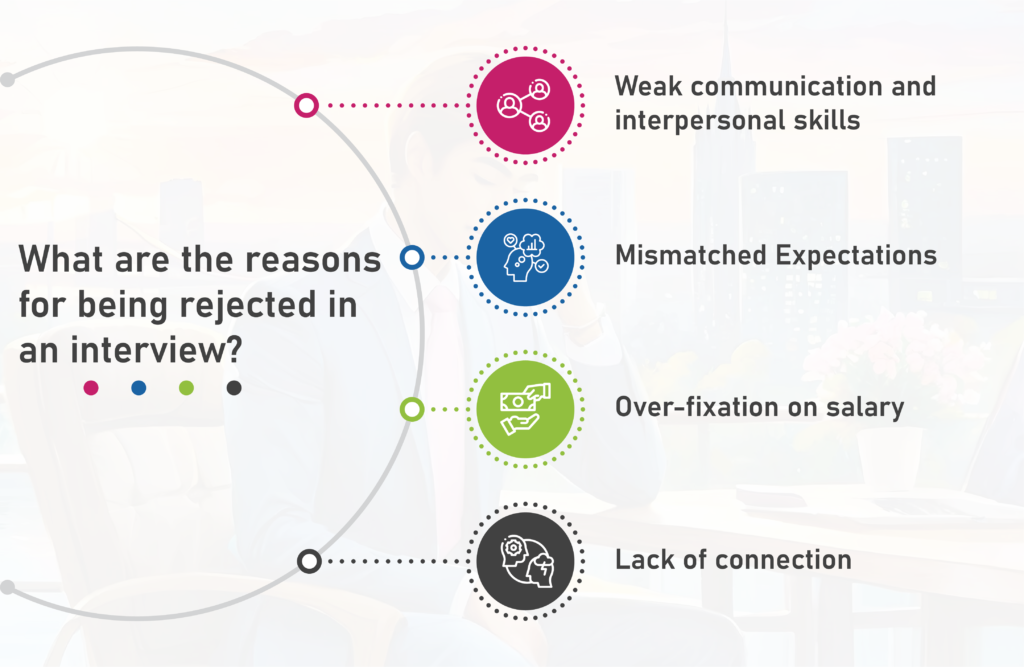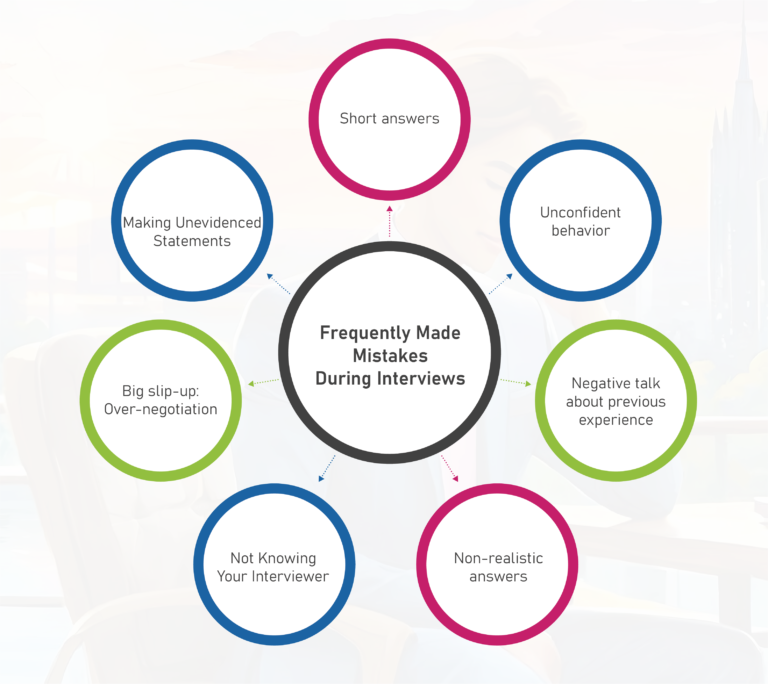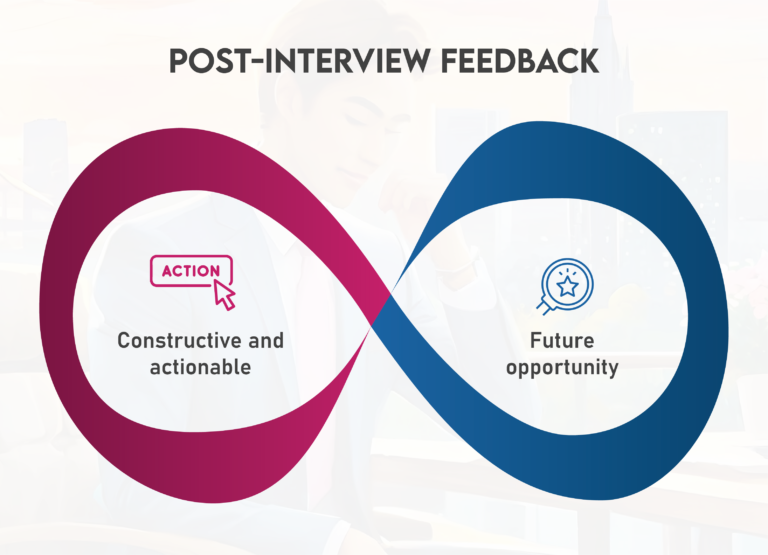How to handle rejection after an interview?
It is more than difficult to define failure because you never know what the direction will be after rejection. No one gets offers from every single interview. It’s crucial to handle rejection and know how to accept interview rejection.
Always better to know where you throw your ball before throwing it, otherwise, it can appear somewhere else.
What are the reasons for being rejected in an interview?

Reasons for candidates failing at job interviews can be many and varied. One thing to remember is that interviewers dearly want to find the right candidate and are very carefully screening every single detail and word. Exploring reasons for being rejected can help you know how to handle rejection after an interview.
- Weak communication and interpersonal skills
Struggling to express ideas clearly, and displaying ineffective verbal skills, collaboration with team and self-organization can significantly hinder you as a technical role prospect during an interview.
The reason is some technical role candidates think that employers demand high expertise in coding and problem-solving and that is the win. But also the ability to effectively communicate complex concepts is essential.
Candidates who fail to articulate their thoughts concisely, provide unclear explanations of their technical solutions, or demonstrate poor communication and interpersonal skills may leave interviewers with doubts about their ability to collaborate with team members.
- Mismatched Expectations
When IT specialists experience a misalignment between their career aspirations, expectations, and the actual dynamics of a role or company, it can lead to rejection in interviews. This misalignment often stems from a lack of clarity about the role’s responsibilities, and the company’s culture. If you are seeking opportunities for professional growth and innovation but discover that the company prioritizes maintenance over development, it may create a disconnect between their goals and the reality of the position.
- Over-fixation on salary
In the dynamic field of IT innovation and collaboration are crucial, an excessive focus on compensation can signal a short-term mindset and a lack of alignment with the organization’s long-term objectives. Of course, salary is an important factor and candidates must know how to balance their financial expectations with their enthusiasm for the role.
- Lack of connection
An interview is a form of conversation and exchange. Regardless of your level of interest in the company or position, you should never treat it as if you are unfamiliar. Disengagement in the process, lack of interest in the other person and the company may seem distracted. Even if you are a highly skilled IT specialist, without the ability to build personal connections with your future team, you decrease your chance of success.
Frequently Made Mistakes During Interviews

Please ensure to prepare well and research details about the company or its products/services. These demonstrate interest and commitment.
- Short answers
One of the frequently made mistakes during interviews is “close answers”. If the question requires confirmation or denial, it does not mean you should say just “yes/no”.
As a sign of interest, your following explanation and confirmation.
At the same time never use unfocused board sentences for clear questions. Give examples for clarification wherever appropriate.
- Unconfident behavior
You may have your key achievements, know your strengths and know what you bring. Yet you may become reserved during interviews and feel hesitant to enthusiastically discuss achievements and successes in your career so far.
Self-presentation is a must, as no one will do it on your behalf. As a result, you miss valuable opportunities to showcase your skills, experience, and potential contributions to the role. Overcoming this shyness and learning to communicate clearly is essential for making an effective and strong impression during the interview process. Please remember: it is not so much about confidence as it is about clarity. Be precise with the facts, give good examples. An experienced interviewer will always understand you are nervous and that won’t be an issue as long as you are well-prepared.
- Negative talk about previous experience
Speaking negatively about past employers or experiences can raise red flags for the interviewer and reflect poorly on your professionalism. It may suggest that you have difficulty working collaboratively or resolving conflicts constructively.
Focus on what you’ve learned from those experiences and how they’ve contributed to your professional growth.
- Non-realistic answers
Be honest instead of following the “Fake it until you make it” saying. Honesty is the best policy when it comes to navigating interviews and building meaningful connections with potential employers. When you are asked about something, just give realistic answers. Be honest and be real about your qualifications, experiences, and skills, that is essential for trust with the interviewer. Experienced interviewers can easily detect your bragging answers or exaggeration which may lead to distrust or disqualification from the hiring process. Everyone wants to work with honest people.
- Not Knowing Your Interviewer
There are countries where women are not perceived or accepted in leadership roles, and candidates from such cultural backgrounds may not consider women in positions of decision-maker. But in the German case that is not relevant. Avoid making assumptions or displaying discriminatory behavior based on stereotypes.
Research who is the interviewer beforehand, who should lead the interview, and who holds leadership positions. There is a case we have seen, when the HR director entered the interview and started the conversation but a candidate responded “Shouldn’t we keep waiting for the boss to come?” Understand who you are going to communicate with and who is the important receiver of your answers. Another candidate addressed the male assistant with all respect while asking the female director to get the coffee. These situations are real and no need to mention that they end the hiring process there and then.
Address the attendants in your interview directly by name and be informed about their background through their work on their LinkedIn profile and mention it during your speech. It will not only be appreciated that you are familiar with their current occupation but also beneficial for you to feel comfortable knowing who is in front of you.
- Big slip-up: Over-negotiation
Many countries have a common cultural practice of negotiating, but it is a less usual cultural trait in Germany.
German companies have the tendency to announce the real salary first and there is no sense to negotiate. The employer might even get an impression of you being unsophisticated or uneducated, they typically do not feel comfortable engaging in such negotiations during the initial stages of the interview process.
You can find insights about that topic and understand what is negotiable during an interview in Germany in the following article: Guide to Successful Salary Negotiation For International Candidates in Germany
- Making Unevidenced Statements
Unsupported claims can come across as insincere. Naturally, you want to highlight your strengths and achievements, but without evidence, your statements are not effective.
A better way is to back up your statements with concrete examples, quantifiable results, or relevant stories. This is a hugely important reminder for you: provide only evidence-backed statements, it is a powerful tool for making a memorable and convincing case.
Example for an unevidenced statement: “I am very well organized!”
Example for an evidenced statement: “I am strong in self-organization. I plan the day the night before. Have a visual project overview in a professional tool at all times. Even others on my team ask me to help with organizing and structuring their projects.”
Post-Interview Feedback

In the absence of focus, we are
A candidate can leverage feedback from interviews, whether they were successful or not. The potential for personal and professional development comes from receiving feedback after an interview.
Rejection email most of the time is automatic email, especially when a company has a lot of candidates to inform.
The case of personalized post-interview feedback, which is best practice, can have a significant impact on both parties involved.
- Constructive and actionable
Informing about rejection can not be considered as feedback. After interview rejection feedback should be a catalyst for personal and professional growth, to improve future interview performance and overall job search strategy.
The meaningful feedback includes observations about strengths and guidance on areas for improvement.
- Future opportunity
When you get constructive feedback with valuable insights, consider the company as a place where you are welcome to apply for a later opportunity.
52% of candidates who are given job-related feedback after an interview, are likely to maintain a relationship with the company.
How to overcome and move forward

Handling rejection with professionalism and using it as an opportunity for growth and self-reflection can ultimately lead to new and unforeseen opportunities.
- Analyze the reactions & Review your answers
During interviews there are common “famous” questions where there is no right/wrong answer, the main thing is to speak freely and honestly. Analyze the reactions you receive to your answers, it can assist in revealing why you have been unsuccessful.
IT candidates seem to struggle when asked non-technical questions, but it has the goal of exploring basic communication skills.
Put aside your disappointment, deal with rejection, and take time to learn and prepare convincing answers.
- Do not take it personally
Remember that your current candidate level was rejected in the interview, not You.
If you are not the “right fit” for the job, it does not mean your knowledge and experience are in doubt in your field. Interview rejection email focuses on your performance and qualifications in terms of relevance, rather than judgments to your professional abilities.
- Update your Resume
Your resume should accompany you into the interview and it should serve as a non-verbal presentation consisting of all your experience and abilities.
Customize your resume to align with the specific position and company you’re applying to. If the job description emphasizes the need for a team-oriented senior software engineer, be sure to highlight instances where you’ve effectively led teams and collaborated with others in your previous roles. Well, the packaging is the first power to impress.
WANT TO MIGRATE PROFESSIONALLY
TO GERMANY?
Engaging Facts and Figures around the Hiring Process
(Each figure presents different surveys and statistical sources conducted internationally in the year 2023)
- For every 118 job applicants submitted, roughly 24 people will advance to the interview stage of the hiring process meaning 20% of the applicants are called for an interview according to a Forbes report.
- 94% of candidates expect to get feedback after a job interview.
- About 40% of interviewers said they did not move on with a candidate because of their lack of confidence.
- 53% of job seekers have had at least one negative experience in the hiring process.
- 32% of candidates expect to learn about the next steps in the hiring process during the initial interview.
- Video interviews are now used in the employment process by 67% of recruiters. This shows a 49% increase from the previous year
- 50% of interviewers believe that a candidate can be eliminated for a job based only on how they behaved, dressed, or entered the room.
- German companies commonly request applicants to furnish both a thorough CV and a cover letter, with 96% of employers deeming the latter crucial for their selection process, as per Hays survey results.
Basic tips for success in an interview as a software engineer in Germany

- Ask for an interview format in advance
Different companies may have different interview formats. Knowing the format in advance allows you to understand what to expect, whether it’s technical coding challenges, behavioral interviews, or a combination of both. It can help you to focus on preparation accordingly and reduce the chance of being rejected in an interview.
- Connect on LinkedIn in advance
LinkedIn profiles often provide valuable insights into the professional background, experience, and interests of the interviewer.
Even if the current opportunity doesn’t work out, if you are rejected in an interview, maintaining connections on LinkedIn can lead to future career opportunities or professional collaborations.
- Practice Problem-Solving
The German tech industry relies heavily on technical interviews to assess a candidate’s coding skills and problem-solving abilities. Successfully solving coding challenges during the interview demonstrates that you have the technical competence required for the role.
- Be communicative and ready to assess your soft skills
Collaboration and teamwork are highly valued in German work culture. Hiring managers expect IT specialists to demonstrate effective communication skills and often prioritize cultural fit when hiring.
- German Language Interviews
When pursuing job opportunities in Germany, international candidates often encounter the challenge of attending interviews in Germany.
If you have put the work to learn German up to the level lets say B1, it will not yet be easy to conduct interviews in German language, but possible.
Even if your German skills are not perfect, showing that you have gained them within 9 months, highlights your speed of learning. Your willingness to learn in German in such a short period of time like our 9-months journey can positively influence the interviewer’s perception of your commitment as it demonstrates your dedication to integrating into the German work environment.




